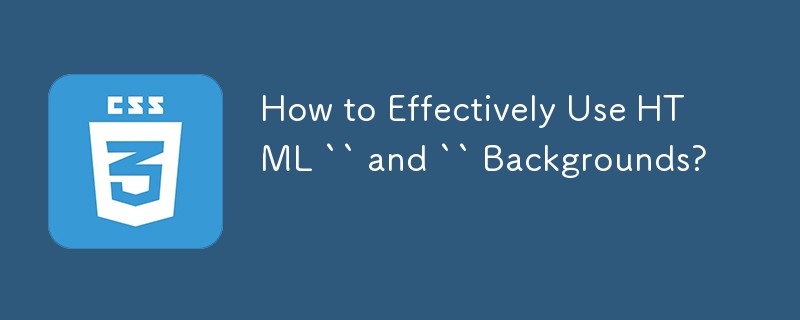How to Effectively Use HTML `` and `` Backgrounds?

How to Utilize Backgrounds for and/or
This guide addresses the different scenarios when applying backgrounds to HTML documents, clarifying why specific behaviors occur and providing solutions for achieving desired background effects.
Applying Backgrounds to and
It's essential to note that there's a difference when setting background properties on the and elements in standards mode.
- When applying a background to : The background will occupy the entire visible portion of the page, regardless of the actual size of the element.
- When applying a background to : The background will only cover the area occupied by the element, which is often larger than the visible area due to the default margins applied to the element. In such cases, the element's background color will "bleed" through the element.
Superimposing Backgrounds
To achieve effects like a background color with a semi-transparent image overlay, it's not necessary to use separate and elements. Instead, utilize the background-color and background-image properties in conjunction:
1 2 3 |
|
Combining Multiple Background Images
To combine multiple background images, you can utilize CSS2 techniques or take advantage of CSS3 enhancements:
- CSS2: Set different background images on both the and elements. Ensure the element has a defined height to accommodate the 's background:
1 2 3 4 5 6 7 8 9 |
|
- CSS3: Utilize the multi-layered background syntax:
1 2 3 |
|
Providing Fallbacks
If your goal is to support older browsers, utilize the CSS2 method for applying multiple backgrounds as it's supported back to IE7. Keep in mind that the CSS3 multi-layered background syntax may result in only the bottommost layer having a background color.
The above is the detailed content of How to Effectively Use HTML `` and `` Backgrounds?. For more information, please follow other related articles on the PHP Chinese website!

Hot AI Tools

Undresser.AI Undress
AI-powered app for creating realistic nude photos

AI Clothes Remover
Online AI tool for removing clothes from photos.

Undress AI Tool
Undress images for free

Clothoff.io
AI clothes remover

Video Face Swap
Swap faces in any video effortlessly with our completely free AI face swap tool!

Hot Article

Hot Tools

Notepad++7.3.1
Easy-to-use and free code editor

SublimeText3 Chinese version
Chinese version, very easy to use

Zend Studio 13.0.1
Powerful PHP integrated development environment

Dreamweaver CS6
Visual web development tools

SublimeText3 Mac version
God-level code editing software (SublimeText3)

Hot Topics
 Vue 3
Apr 02, 2025 pm 06:32 PM
Vue 3
Apr 02, 2025 pm 06:32 PM
It's out! Congrats to the Vue team for getting it done, I know it was a massive effort and a long time coming. All new docs, as well.
 Can you get valid CSS property values from the browser?
Apr 02, 2025 pm 06:17 PM
Can you get valid CSS property values from the browser?
Apr 02, 2025 pm 06:17 PM
I had someone write in with this very legit question. Lea just blogged about how you can get valid CSS properties themselves from the browser. That's like this.
 A bit on ci/cd
Apr 02, 2025 pm 06:21 PM
A bit on ci/cd
Apr 02, 2025 pm 06:21 PM
I'd say "website" fits better than "mobile app" but I like this framing from Max Lynch:
 Stacked Cards with Sticky Positioning and a Dash of Sass
Apr 03, 2025 am 10:30 AM
Stacked Cards with Sticky Positioning and a Dash of Sass
Apr 03, 2025 am 10:30 AM
The other day, I spotted this particularly lovely bit from Corey Ginnivan’s website where a collection of cards stack on top of one another as you scroll.
 Using Markdown and Localization in the WordPress Block Editor
Apr 02, 2025 am 04:27 AM
Using Markdown and Localization in the WordPress Block Editor
Apr 02, 2025 am 04:27 AM
If we need to show documentation to the user directly in the WordPress editor, what is the best way to do it?
 Comparing Browsers for Responsive Design
Apr 02, 2025 pm 06:25 PM
Comparing Browsers for Responsive Design
Apr 02, 2025 pm 06:25 PM
There are a number of these desktop apps where the goal is showing your site at different dimensions all at the same time. So you can, for example, be writing
 How to Use CSS Grid for Sticky Headers and Footers
Apr 02, 2025 pm 06:29 PM
How to Use CSS Grid for Sticky Headers and Footers
Apr 02, 2025 pm 06:29 PM
CSS Grid is a collection of properties designed to make layout easier than it’s ever been. Like anything, there's a bit of a learning curve, but Grid is
 Google Fonts Variable Fonts
Apr 09, 2025 am 10:42 AM
Google Fonts Variable Fonts
Apr 09, 2025 am 10:42 AM
I see Google Fonts rolled out a new design (Tweet). Compared to the last big redesign, this feels much more iterative. I can barely tell the difference






